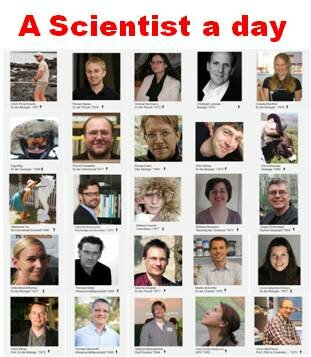Computational biochemist (EN)
uli Brandt-Bohne | Jun 25, 2012 | Kommentare 1

Jordi Villà-Freixa loves Biology and Nature in general. He is a Chemist who now works as Director of the Polytechnical School at the University of Vic in Catalonia.
How did you get to Science – the origins?
Since his infancy he got passionate about Nature, he explains. `My father´, he goes on, `having himself a technical degree in chemistry and being a perfumist who created his own formulas, lead my steps into the forests surrounding my village in the shoreline of the Mediterranean sea, El Masnou, just 20 kilometers north of Barcelona. There they used to collect mushrooms when it was the time and when they were lucky. When he was not in the forest with his father or with his dog, he used to spend hours taking care of the plants in his parent’s home terrace. Plants led to animals and he ended up having a minifarm with dog, cat, chicken, duck, turtles, tortoises, guinea pigs, tritons…. and himself… He also tried to make experiments with a chemistry kit for kids, but ended up being a problem for the neighbours when he and his friend started creating fireworks from matches heads. `So, I decided that my abilities in science would become more useful as an observer, leaving the actual `doing of things´ for others´, he resumes.
Fearing that working with animals and plants would not allow him to feed his future family, he ended up with a Chemistry degree, in wich he (`and the humanity, I’d say´, he adds) was fortunate enough to discover that one can do science with a computer as well. `So… here we are, working on computational biochemistry, but still dreaming to become a Jackes Cousteau or a Félix Rodríguez de la Fuente some day or another´, he says.
Are you where you first planned to be?
`I have had many different interests in Science, although my career has been always around biology and computing´, Jordi explains. He would have loved to work in the field and not in an office, he smiles and asserts to be a frustrated ecologist. However, he has found his way to get closer to aspects related to biodiversity.
`I am happy now to direct a School where engineering mixes with biosciences in a well balanced way´, he describes his acutal work, `and in an University in a small city in central Catalonia, with direct access to the wonderful natural surroundings´. In this sense, many initiaives in his university are leading to a better integration with the needs of such environments, he adds.
Your biggest scientific achievement?
`Having helped to understand the way enzymes work, by dissecting and discerning the different individual effects in a quantitative way´, he explains very proud. He explains that there has been a strong argument in scienctific literature about the origin of the catalytic power of enzymes, whether it is due to their dynamical behavior or to statistical fluctuations based on the energetics. He and collegues demonstrated that the latter case is the correct answer. During his postdoctoral stay at Arieh Warshel’s lab at USC in Los Angeles, he understood that in Science one should quantify the information, if the answers one finds are to be generalized. `Otherwise we get trapped in circular non-productive discussions´, he says.
The biggest scientific achievement?
As a big scientific acchievement he describes the power to access genomic data in a fraction of time and resources than ever before. In his opinion, there are several great scientists who all are exceptional in their own context.`It is easier to identify big names from the past because history singled them out of the rest of mortals for reasons not necessarily related to their science, sometimes´, Villà-Freixa explains.
However, he would put Euler on top of the list, because of his immense amount of work in several mathematical fields. He also mentions Alan Turing, who would have his 100th birthday this year.
Both Scientists created the grounds for building science and technology on top of their work, and those really represented turning points in the history of science.
Questions and findings?
He would like to know where the mind is. And: he would like to discover `the tiniest ant in the weirdest place in the farthest desert and, surely, its name would be Insolitus formica´.
What should be different in Science?
`The way we evaluate achievements´should be different in Science according to Jordi. `Ideas are around, we are simple funnels collecting copies of them and putting them in a piece of paper for others to understand´, he adds. In his oppinion `achievements are human, not individual, although it is good to value the fact that some individuals are more prone to collect those ideas than others.´ He also thinks that egocentrism is a powerful driving force, but sometimes too strong and too misleading.
The Science of the future and things that go wrong
The Science of the future to Villà-Freixa looks absolutely technological: everything will already be invented and the power in our hands will be inmense. However `it will also be absolutely abstract´he adds, `as we will be rephrasing the Big questions on us again and again, even as an exercise´.
In the Scientists oppinion, academism is one of the major deficits in Science.
You can also participate in A Scientist a day, find more information in english here.
Du kannst auch bei A Scientist a day teilnehmen, mehr Information dazu gibt es hier.
Popularity: 11% [?]
Ähnliche Artikel:
Kategorie: A Scientist a day • Featured
 Kommentare (1)
Kommentare (1)
Einen Kommentar hinterlassen | Trackback URL


[...] Post at the Science Meets Society blog [...]